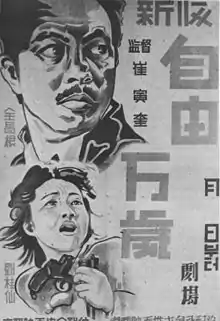Viva Freedom!
Viva Freedom! (자유만세, Jayu Manse, aka Hurrah! For Freedom) is a 1946 Korean film directed by Choi In-kyu. It was the first film made in the country after achieving independence from Japan. During the colonial period, Choi was only allowed to make certain films, but the plot of Viva Freedom! is distinctly different, telling the story of a Korean patriotic resistance fighter in 1945.

| Viva Freedom! | |
|---|---|
 Theatrical poster to Viva Freedom! (1946) | |
| Hangul | 자유만세 |
| Hanja | 自由萬歲 |
| Revised Romanization | Jayu Manse |
| McCune–Reischauer | Chayu Manse |
| Directed by | Choi In-kyu[1] |
| Produced by | Choi Wan-gyoo |
| Written by | Jeon Chang-geun |
| Starring | Jeon Chang-geun Hwang Yeo-heui Yu Gye-seon |
| Music by | Pak T'ae-hyeon Jo Baek-bong |
| Cinematography | Han Hyeong-mo |
| Distributed by | Koryo Film Co. Ltd. |
Release date |
|
Running time | 53 minutes |
| Country | Korea |
| Language | Korean |
Plot
Protagonist Choi Han-jung, who was imprisoned for his independence activism, succeeds breaking out of prison. He stays at his friend's house whose name is Park Jin-beom and also a comrade to his cause for independence. He meets his other political comrades in a basement under a house built in a western style, and persuade them to continue their resistance to the Japanese Kenpeitai in the 1940s, when the fall of the Japanese empire was imminent. However, a member of the movement gets caught by the Japanese while moving the dynamite, which leads to Choi striving to save him and end up surrounded by the Japanese military police. He hides in the residence of Mi-hyang, who is a mistress of the Japanese police high official Nanbu (南部). A gunfight with the Kenpeitai ensues, which leads to Choi being injured and imprisoned in a university hospital while receiving treatment. With the help of nurse Hye-ja who loved Choi, Han-jung can keep doing his endeavors for independence. With the atomic bomb on Hiroshima and Nagasaki, Korea gains its independence as a result of the surrender of Japan. While the streets of Jongno celebrate the event, Han-jung searches for the tomb of Mi-hyang, who lost her life.[2]
Cast
Choi han jung: Jeon Chang-geun (全昌根)
Mihyang: Yu Gye-seon (劉桂仙)
Hyeja: Hwang Yeo-heui (黃麗姬)
Reception
The film was well received by the then audience who was touched by the liberation of Korea.[3]
Chiang Kai-shek is reported to have written a calligraphic banner that reads "Viva freedom! Viva Korea! (自由萬歲 韓國萬歲)" after watching the movie in china.[4]
Literature
『한국영화전사』(이영일,삼애사,1969) 『한국시나리오선집』 Ⅰ(영화진흥공사,1982)
References
- Infobox data from Jayu Manse at IMDb and "Hurrah for Freedom (Jayumanse)(1946)". KMDb Korean Movie Database. Retrieved 2007-12-27.
- https://encykorea.aks.ac.kr/Contents/Item/E0048023
- https://encykorea.aks.ac.kr/Contents/Item/E0048023
- https://web.archive.org/web/20181123155640/http://www.daehancinema.co.kr/MovieInfo/News_Content.asp?idx=MI0001075080&mi_type=03&page=2179&key=title&search=
External links
- Jayu Manse at IMDb
- Adam Hartzell's review at koreanfilm.org
- "Hurrah for Freedom (Jayumanse)(1946)". KMDb Korean Movie Database. Retrieved 2007-12-27.